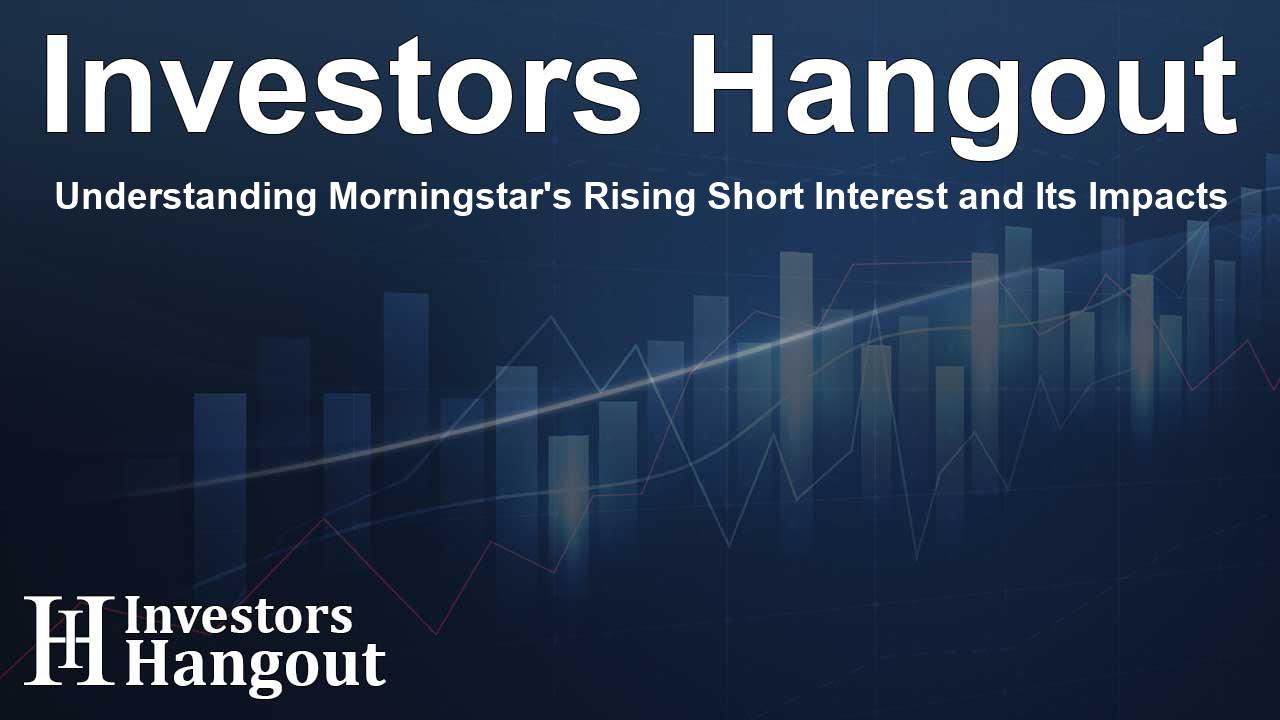Understanding Morningstar's Rising Short Interest and Its Impacts

Morningstar's Increased Short Interest: A Market Insight
Morningstar's short interest as a percentage of float has notably increased, reflecting heightened market activity. With a staggering rise of 42.5% since its last report, there are currently around 933 thousand shares sold short, representing 3.42% of all regular shares available for trading. If traders were to cover their short positions, it would take approximately 2.49 days based on the current trading volume.
Why Should Investors Care About Short Interest?
Understanding short interest is crucial for investors as it indicates market sentiment toward a stock. Simply put, short interest refers to the number of shares that have been sold short but are not yet covered or bought back. This practice—known as short selling—allows traders to sell shares they do not own with the expectation that the stock's price will decline. If the stock price indeed drops, short sellers profit. However, if it rises, they face potential losses.
A surge in short interest can signify a wave of pessimism from investors regarding a stock, while a decline can indicate growing optimism. Thus, monitoring short interest levels can be insightful for gauging market trends and investor behaviors.
Analyzing Morningstar’s Current Market Position
As highlighted, the short interest in Morningstar has grown since its previous report. While this might prompt concerns among investors, it’s essential to approach the data with context. More shares being shorted does not necessarily forecast immediate price declines. Traders should remain vigilant and aware of these shifting market dynamics.
Visualizing Short Interest Trends
The short interest trends for Morningstar over the past three months reveal the underlying market sentiment. Although the rise is notable, it serves as a signal for further investigation rather than a definitive forecast of the stock’s movement. Awareness of these patterns can empower investors to make more informed decisions.
Peer Comparisons: How Does Morningstar Stack Up?
When evaluating a stock, peer comparisons are vital. They allow investors to contextualize a company’s performance relative to its competitors. Morningstar’s peer group has an average short interest as a percentage of float at 5.00%. This data shows that Morningstar has less short interest than many of its competitors, suggesting it maintains a relatively favorable market perception.
The Bullish Side of Increasing Short Interest
Interestingly, an increase in short interest can sometimes correlate with bullish outcomes for a stock. Investors practicing short selling might later be compelled to cover their positions, particularly if the stock price rallies unexpectedly. Thus, understanding the dynamics of short interest can reveal potential trading opportunities for savvy investors.
Conclusion: Navigating the Market Landscape
As we unpack the intricacies of Morningstar’s short interest, it becomes clear that ongoing monitoring and analysis are essential for making sound investment decisions. Investors should continue to track these trends and consider the broader market context as they evaluate their positions in Morningstar stock.
Frequently Asked Questions
1. What is short interest in stocks?
Short interest refers to the number of shares that have been sold short but not yet bought back. It reflects investor sentiment about the stock's price movement.
2. How does short selling work?
Short selling involves selling shares that an investor does not own, hoping to repurchase them at a lower price to profit from the difference.
3. Why is increasing short interest significant?
Increasing short interest can indicate that investors are becoming more bearish about a stock. It is a useful metric for understanding market sentiment.
4. Can high short interest predict stock price drops?
While high short interest can signal bearish sentiment, it does not guarantee price drops. Market conditions can change rapidly.
5. How does Morningstar's short interest compare to its peers?
Morningstar’s short interest is below the peer group average of 5.00%, suggesting a relatively positive market outlook compared to its competitors.
About The Author
Contact Owen Jenkins privately here. Or send an email with ATTN: Owen Jenkins as the subject to contact@investorshangout.com.
About Investors Hangout
Investors Hangout is a leading online stock forum for financial discussion and learning, offering a wide range of free tools and resources. It draws in traders of all levels, who exchange market knowledge, investigate trading tactics, and keep an eye on industry developments in real time. Featuring financial articles, stock message boards, quotes, charts, company profiles, and live news updates. Through cooperative learning and a wealth of informational resources, it helps users from novices creating their first portfolios to experts honing their techniques. Join Investors Hangout today: https://investorshangout.com/
The content of this article is based on factual, publicly available information and does not represent legal, financial, or investment advice. Investors Hangout does not offer financial advice, and the author is not a licensed financial advisor. Consult a qualified advisor before making any financial or investment decisions based on this article. This article should not be considered advice to purchase, sell, or hold any securities or other investments. If any of the material provided here is inaccurate, please contact us for corrections.
